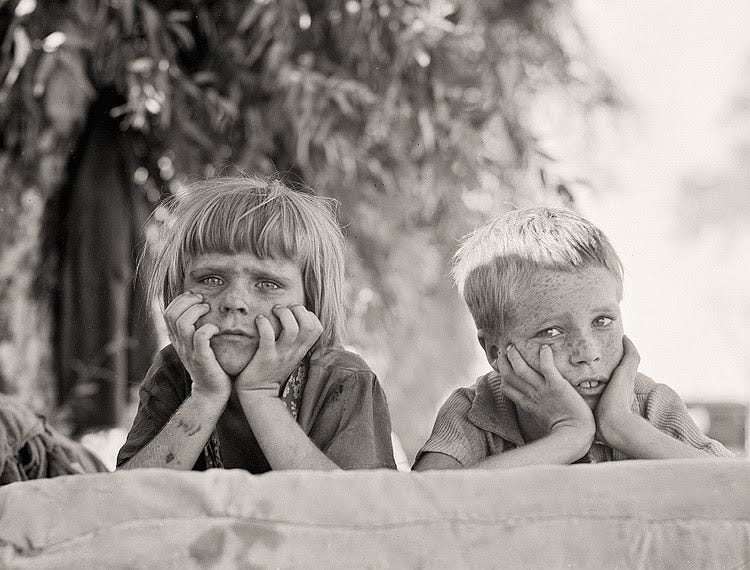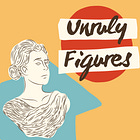Book Review: Riding Like the Wind & Whose Names Are Unknown
books review? book reviews?
Hi friends,
I’ve been wanting to start writing book reviews here for a while so I’m excited to finally start! I’m especially happy to be starting with my friend
’s new book Riding Like the Wind. Since her book is a biography of the author Sanora Babb and Babb’s book Whose Names Are Unknown, I figured it would be fitting to pair the books together.As a side note, if you recognize Iris’s name, she interviewed me earlier this year about my book Unruly Figures! You can check out that interview too.
The Erased Voice of Sanora Babb
When you think of the Dust Bowl, you might think of two things: the intense and moving photos of Dorothea Lange or the novel The Grapes of Wrath, by John Steinbeck. Often seen as the Dust Bowl novel, Steinbeck’s tale has been a staple of curriculums practically since the second it was published. But what if I told you that Steinbeck had cribbed the second half of his book from a younger female writer who was actually from the region impacted by the devastating drought of the 1930s?

Her name was Sanora Babb.
Born in Oklahoma Territory in 1907, Sanora Babb lived a hard scrabble life for a couple of decades. Her father was a gambler and abusive, the land was alternately beautiful and harsh. Even in the years before the drought began in 1930, farming in the territories of Oklahoma, Kansas, and Colorado was precarious: One bad harvest could kill a family. The Babbs nearly died of starvation more than once, but made it against the odds.
Babb became a writer and made it to Los Angeles. When the dust storms began and refugees began to pour into California, she worked with the Farm Security Administration, where she took extensive notes about the scenes she saw and the families she met. In the spirit of camaraderie and communism (she was a registered Communist Party member) she shared her notes with John Steinbeck, who used them to quickly churn out his book The Grapes of Wrath. Probably unbeknownst to him, Babb had already secured a contract for her novel about the Dust Bowl, Whose Names Are Unknown. Just three weeks before Random House published her novel, Steinbeck’s came out, and her editor immediately cancelled her contract. The novel languished in Babb’s desk drawer until 2004, when it was finally published while she was on her death bed.

This is a rough sketch of her life—honestly, Babb is probably a character I should cover on the podcast. In her biography, Iris dives deep into the beautiful defiance that made up Babb’s character. She was determined, strong, and a great believer in humanity. What makes a great biography, I believe, is when the author loves their subject a little bit. Not in love with them, but a deep abiding empathy for their situation is absolutely necessary. Maybe loving them as a family member would; seeing both their flaws and their strengths and accepting them on equal ground. This is exactly the kind of biography Iris delivers.
In Riding Like the Wind, it’s easy to see the love and empathy Iris has for Babb. Both women are writers with keen observational skills and writing the sort of clean and relatable prose that is eminently quotable. You get the feeling that Iris sees Babb, even though their paths never directly crossed. Her biography isn’t just a recitation of facts and conjecture, nor is it solely a mathematical proof of Steinbeck’s magpie-like adoption of Babb’s work. What comes across is a portrait of a brave and talented woman who rebelled against America’s attempt to relegate her to a two-bit player, another “wife of” instead of remembering her as an artist in her own right.
Reading Riding moved me to pick up Whose Names Are Unknown, Babb’s work that was shoved out of the spotlight by Steinbeck’s gargantuan fame. What struck me first is how autobiographical Whose Names is—an early scene in a Colorado thunderstorm mirrors perfectly a disastrous storm in Babb’s own childhood. The next thing that struck me is that this is a Dust Bowl novel. The story Babb wrote about the Dunne family began before the ecological disaster than made them into refugees. It tells the story of their land and the love the had for it, and then it takes you through the horrible dust storms that nearly killed them. Steinbeck’s novel covers only the aftermath. In the light of Babb’s brilliance, Steinbeck’s work is no longer a Dust Bowl novel at all, but a story of internal refugees and American intolerance.
If you’re ready for a more empathetic, moving, visual rendering of before and after the Dust Bowl, pick up Whose Names Are Unknown. And if you’re ready for a candid and beautiful biography of the remarkable woman who wrote it, Iris Jamahl Dunkle’s new book, Riding Like the Wind is out now wherever you get books.
Who doesn’t, after all, love a reclaimed story of an incredible woman? That her work was almost lost to time was very nearly a tragedy, but fortunately dedicated historians and biographers like
have been able to rediscover her.Thanks to University of California Press for sending me an early ARC of Riding Like the Wind! Interested in having me review a book? Shoot me an email.






